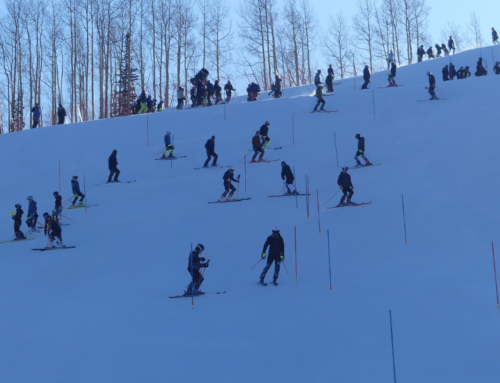Cross-country teams break from Utah camp for New Zealand ritual
Cross-country teams break from Utah camp for New Zealand ritualSOLDIER HOLLOW, Utah — U.S. cross-country skiers are packing this weekend for their annual on-snow camp in New Zealand. They prepped for the camp, which runs until late August, with a two-week camp that ranged from the 2002 Olympic cross-country venue here to the Olympic skating oval in Salt Lake City.
"It's been another good camp," head coach Pete Vordenberg said, pausing as he and his staff conducted interval workouts from the main parking lot at Soldier Hollow, about 20 minutes east of Park City. "We've had a full turnout again and we've covered a lot of different elements."
The camp began with high-speed testing at the Olympic oval, sending athletes through a 120-meter course lined with lights and timers, a series of speed traps designed to measure start speed, acceleration and a drop in speed. The technology first was used a year ago on the five-man team; this year, with 14 athletes nominated to the 2007 cross-country squad (with final naming expected by late summer), it took a little longer to complete, he said, but results showed continued improvement.
Overseeing the intervals session were Vordenberg and Continental Cup coach Matt Whitcomb plus 2002 Olympian Kristina Joder, whose husband Pat Casey is Whitcomb's co-coach with the Continental Cup skiers, recording various individual data at the parking lot. Casey and World Cup coach Justin Wadsworth drove the roller-ski route to keep an eye on the athletes as they pounded over the blacktop and back to the parking lot. University of New Hampshire coach Sarah Walker took part in the management, too.
"I think it's important," Vordenberg said, "to look at this whole thing as a long process, but not one day escapes, either. Every single day is as good as it can be … every single day. It requires patience but also a kind of urgency. Every day you get out of the van and you know what you need to do, and you're ready … and you do it, so that at the end of every day you've made a step forward, even on a rest day.
"It's about details and being professional," he said.
Kikkan Randall, who won three more U.S. titles last January at Soldier Hollow before coming up with the best all-time U.S. women's Olympic or World Championships cross-country result during the Torino Winter Games in February (ninth in the sprint), and who then produced the best U.S. women's World Cup showing (fifth in a sprint in Sweden), agrees.
"We're getting things done every day. This is great," she said. "There's something new every day."
Olympian Leif Zimmermann, coming back from mononuleosis, added, "It's not just go to camp, go to a meeting, go home and watch TV, or whatever. We have a cook — Pat's mom is here, so we're able to come together and eat together, prepare food together and talk to each other so it's not simply training and training talk."
Walker is just the latest club coach to work with the national team, Zimmermann said. Colorado coach Bruce Cranmer and Montana's Bridger nordic coach Dragan Danevski also have plugged into previous training sessions. "It's awesome to have so many other coaches here, looking to learn from Pete and the staff," Zimmermann said. "I hope more come when we get back from New Zealand. There's good energy — and it's a really good environment."
Two-time Olympian Andrew Johnson, who was the first to join the U.S. residence program in Park City in 1999 after taking leave fro Middlebury College, echoed his two Olympic colleagues. "This training we're doing now, I really enjoy it," he said. "This training's fun. It feels very productive. It's high quality training and feels like every minute of every workout we're accomplishing exactly what we want to do. There's no wasted time."
At the same time, Vordenberg cautions, the current camps are merely a snapshot of what the end product can be. "I think it's important to look at this whole thing as a long process, but not one day escapes, either. Every single day is as good as it can be … every single day.
"It requires patience but also a kind of urgency. Every day you get out of the van and you know what you need to do, and you're ready … and you do it, so that at the end of every day you've made a step forward, even on a rest day.
"It's about details and being professional."
— USSA





















